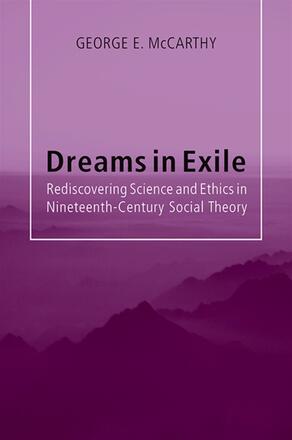
Dreams in Exile
Rediscovering Science and Ethics in Nineteenth-Century Social Theory
Alternative formats available from:
Examines the influence of Aristotle and Kant on the nineteenth-century social theory of Marx, Durkheim, and Weber.
Description
The classical origins of nineteenth-century social theory are illuminated in this sequel to the award-winning Classical Horizons: The Origins of Sociology in Ancient Greece. George E. McCarthy stresses the importance of Aristotle and Kant in the creation of a new type of social science in the nineteenth century that represented a critical reaction to Enlightenment rationality and modern liberalism. The seminal social theorists Marx, Durkheim, and Weber integrated Aristotle's theory of moral economy and practical wisdom (phronesis) with Kant's theory of knowledge and moral autonomy. The resulting social theories, uniquely supported by a view of practical science that wove together science and ethics, proved instrumental to the development of modern sociology and anthropology.
George E. McCarthy is National Endowment for the Humanities Distinguished Teaching Professor of Sociology at Kenyon College. His books include Classical Horizons: The Origins of Sociology in Ancient Greece, also published by SUNY Press; Objectivity and the Silence of Reason: Weber, Habermas, and the Methodological Disputes in German Sociology; Romancing Antiquity: German Critique of the Enlightenment from Weber to Habermas; and Dialectics and Decadence: Echoes of Antiquity in Marx and Nietzsche.
Reviews
"The best thing about this book is what McCarthy has to say about the origins of critical theory, especially in Hume and Kant, and the way in which he manages to merge—or 'synthesize', as he would say—what Marx, Weber and Durkheim have to say on a number of important questions. Significant discussions of objectivity, justice, the theory of value, socialism, human rights, relativism, democracy, market economics, functionalism and friendship are presented by McCarthy, who also provides us with a number of very telling asides, any one of which might provide inspiration for another book. " — Journal of Classical Sociology
"…the proposal of a new perspective on the rise of sociology as an ethical, empirically based discipline at the unusual cross-roads of Aristotle and Kant, together with a consideration of its fundamental authors, is certainly the primary merit and point of interest of this book. By highlighting the 'ethical' dimension of social theory McCarthy thus displays the possibilities of drawing upon the classics as resources of critique for the present. " — Critical Sociology
"…[a] remarkable book. " — CHOICE
"George McCarthy has been exploring paradoxes of this kind for a quarter of a century, and this new book … offers one of the fullest accounts yet published on these themes. " — Contemporary Sociology